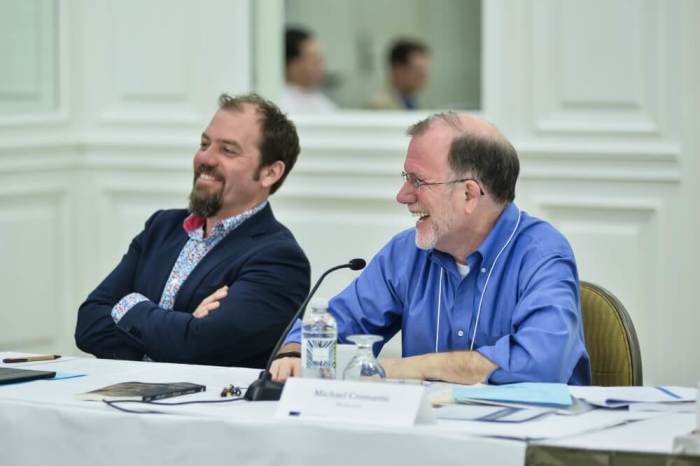Two Possible Futures for Evangelical Churches, According to Christian Philosopher James K.A. Smith

MIAMI BEACH — In our new secular age, there are two possible trajectories for evangelical churches, Christian philosopher James K.A. Smith argued at Faith Angle Forum.
Smith's March 14 talk, "Re-Imagining Religion in a Secular Age," to 20 journalists plus other attendees in Miami Beach, sought to explain different ways of thinking about secularism and how those distinctions can aid our understanding of religion in the public square.
"Secular" can be understood in different ways, Smith explained. It can refer to things that are worldly, as opposed to sacred, spiritual or not religious. This view has led, in some circles, to a view that secular is neutral, or objective, while religious views are unobjective, or value laden.
Smith prefers a different way of thinking about secularism.
Leaning upon the work of philosopher Charles Taylor, Smith says that in our "secular age," religious beliefs should be one option among many different contestable options. The secular age, therefore, does not entail an absence or weakening of religious belief, as the "secularization thesis" holds. Rather, there is a plurality of beliefs, religious and non-religious, all holding contestable views. Those views are contested in the public square.
The secular age brings both rewards and challenges for Christians and non-Christians alike, Smith says. We all now live in a "cross-pressured space," where believers encounter unbelief and unbelievers encounter belief.
"Doubt is the natural accompaniment of faith in a secular age," Smith said.
Doubt has always accompanied faith, as scripture attests, but this is intensified in the secular age.
"Unfortunately, too many religious communities still feel like doubt is the enemy of faith, rather than a companion," Smith said. "... But notice the cross-pressure works on everyone. So, if the believer is tempted to doubt, the unbeliever can also be tempted to believe. There remains a kind of haunting and pressure that is the sort of pull and lure ... of that eternity and transcendence. Nobody gets to ... insulate themselves from cross-pressure."
Quoting Taylor, Smith says the secular age doesn't bring an end to religious belief, but an explosion, or "nova effect," of different types of beliefs.
"So a secular age is not an age of unbelief, it's actually this really messy, complicated, crazy world in which we find ourselves, in which, because people are experiencing all of these multiple cross-pressures, it's almost like the pressure builds up and it explodes, and what you get are all kinds of ways of believing. And you get "Eat, Pray, Love" ways of believing ... a sort of Oprah-significance. There are all kinds of different ways of people pursuing now, a spiritual life," he said.
With that understanding of secularism, Smith found several targets in his analysis of the current state of religion and politics in public life.
Both the religious and non-religious can try to shelter themselves from the cross pressures of the secular age, Smith says, which leads to various religious fundamentalisms, and a type of secular fundamentalism, which Smith also referred to as "dogmatic secularism" and "doctrinaire secularism."
Dogmatic secularism believes that non-religious thought should have a privileged, dominant position over religious thought in the public square. Like religious fundamentalists, dogmatic secularists don't accept that their views, like religious views, are contestable. They "ensconce themselves and insulate themselves from the cross pressure of haunting."
Rather than offering a "spin" on the world, as the religious fundamentalists and dogmatic secularists do, Smith, along with Taylor, prefer a space where everyone can offer their "take" on the world.
Quoting Taylor, Smith said, "Spin is sort of closed off. Spin are the stories we tell, in which we try to protect ourselves and stick our heads in the sand about the cross-pressure."
A "take" is preferable to a "spin," Smith says, because it is open and honest about its own contestability.
Smith suspects the problem in the United States is not simply one of closed-mindedness from religious fundamentalists and dogmatic secularists, but also of geography — people living and working in enclosed communities where they don't encounter people of different beliefs, so their own beliefs are never contested.
"Some religion reporting is a little bit like, 'We went to Mars and we found these people in Colorado Springs and you won't believe what they think.' ... And it's partly because ... [those reporters come] from this tight plausibility structure in which they don't bump into people who think otherwise," he said.
After critiquing dogmatic secularists, Smith turned his attention to his fellow Protestants, evangelicals in particular.
One of the problems of evangelicalism, Smith believes, is that the faith became overly-intellectualized, such that becoming an evangelical simply meant assent to a certain set of beliefs rather than a lived religion.
"And what you get is what Taylor calls a 'dynamic of ex-carnation.' So incarnation is a dynamic of things becoming embodied. 'Ex-carnation' is Christianity becomes increasingly abstracted and disembodied," Smith said.
In the future, however, Smith predicts, again quoting Taylor, that living in the secular age "will intensify a sense of living in a wasteland for subsequent generations, and many young people will begin to explore beyond the boundaries."
This will offer both challenges and opportunities for evangelical churches. Smith believes there are two possible trajectories.



























